Paul Bishop's Blog, page 18
May 7, 2018
WEST OF THE WEST
 THE SHOT RANG OUT
The Shot Rang Out: 52 Western Short Stories is a compilation of 500 word Western micro-shorts, each starting with the same 18 words: The shot rang out. I heard her scream at the same time the bottle crashed to the floor. These 52 stories by 52 different writers scatter off in 52 fascinating, action-filled directions, no two alike...To give you a taste of the tales you'll find inside The Shot Rang Out, here is my contribution, West of the West, which finds Annie Rose, a desperate young girl, forced to choose between two untested skills in order to survive...
WEST OF THE WEST
PAUL BISHOP
I was fourteen and a girl on the bloom that August of 1895. I had the cheapest room on the second floor of the Magnolia Boardinghouse in El Paso. The rundown building was on the edge of Chihuahuita where Mexicans and darkies lived with the Chinese coolies from the railroad.
THE SHOT RANG OUT
The Shot Rang Out: 52 Western Short Stories is a compilation of 500 word Western micro-shorts, each starting with the same 18 words: The shot rang out. I heard her scream at the same time the bottle crashed to the floor. These 52 stories by 52 different writers scatter off in 52 fascinating, action-filled directions, no two alike...To give you a taste of the tales you'll find inside The Shot Rang Out, here is my contribution, West of the West, which finds Annie Rose, a desperate young girl, forced to choose between two untested skills in order to survive...
WEST OF THE WEST
PAUL BISHOP
I was fourteen and a girl on the bloom that August of 1895. I had the cheapest room on the second floor of the Magnolia Boardinghouse in El Paso. The rundown building was on the edge of Chihuahuita where Mexicans and darkies lived with the Chinese coolies from the railroad.Except for whores and drunkards, no white folk lived at the Magnolia. I wasn’t a drunk, but if I didn’t do something I’d soon be a whore at the Gallows Saloon across the street. Through the flyspecked glass of my room’s crooked window, I could see the batwing doors of that fine establishment. They swung open and closed, letting in the rough men who might soon be getting me to open and close my legs.
Mother died of fever when I was ten. Daddy took to drinkin’ for a while, but he was a doin’ man who made a livin’ with his wits. When he stuffed down his grief, I stuffed mine down too. We was pretty companionable.
Daddy taught me to read and write when I was real young. I think he only did it so I could read the stories he churned out for them penny dreadfuls. They sold by the bushel to folks back East who don’t know how boring the West really is.
I asked him why he made up such nonsense. He said he wrote about a place West of the West. It was a place that paid us eatin’ money. I read all them stories. They were pretty exciting, full of shooting and manly heroes who always won.
With mother gone, Daddy took me on his trips to get more stories. We traveled in a mule drawn wagon. I drove. Daddy sat in back writin’. In every town, Daddy went to the Western Union office and telegramed the editor who published his made up West of the West tales. When notified back, Western Union gave Daddy the money he was owed. Daddy would then go to the post office and send off his new stories.
Daddy used to write on big paper pads, but then he bought a newfangled thing he called a Ford typewriter with tippy-tappy keys. I don’t know if he wrote better stories, but he did tap ‘em out faster in the back of our wagon.
Daddy got scratched by a rusty wagon nail when we got to El Paso. It turned gangrene and he died. Now all standing between me and becoming a soiled dove was what Daddy left behind...his Ford typewriter, blank paper, two ink ribbons, and the address of his editor—who didn’t know Daddy was dead.
I was scared. I didn’t know if I could do it. I’m not talkin’ about being a whore. That scared me more. I decided I best get West of the West. I rolled paper into the typing machine and began to tap—The shot rang out. I heard her scream at the same time the bottle crashed to the floor.
Published on May 07, 2018 19:39
April 29, 2018
THE SHOT RANG OUT
 THE SHOT RANG OUTNow available in paperback and ebook—The Shot Rang Out: 52 Weeks • 52 Western Short Stories. Each tale starts with the same 18 words: The shot rang out. I heard her scream at the same time the bottle crashed to the floor.
THE SHOT RANG OUTNow available in paperback and ebook—The Shot Rang Out: 52 Weeks • 52 Western Short Stories. Each tale starts with the same 18 words: The shot rang out. I heard her scream at the same time the bottle crashed to the floor.These 500 word micro-shorts scatter off into 52 fascinating, action-filled directions, no two alike.
My contribution is entitled West of the West, and finds Annie Rose, a desperate young girl, forced to choose between two untested skills in order to survive...
Published on April 29, 2018 20:30
March 21, 2018
THE NEW WILD WEST
 THE NEW WILD WESTThe Longmire novels by Craig Johnson and the popular television series based on the character have sparked a renaissance in the modern day western. Films like Hell Or High Waterand Wind River have also raised awareness of contemporary stories dealing with the themes and challenges of the modern Wild West. Sixguns have been replaced by .45s, bows and arrows by hunting rifles, and horses by Jeeps, pick-up trucks, motorcycles, and ATVs, but the men and women of the modern western are the same tough breed of self-reliant, independent, individuals who ain’t got no back down in ‘em. Right and justice might not be a matter of white hats and black hats anymore, but there are more than enough modern outlaws, greedy land barons, crooked sheriffs, and scofflaws to go around.
THE NEW WILD WESTThe Longmire novels by Craig Johnson and the popular television series based on the character have sparked a renaissance in the modern day western. Films like Hell Or High Waterand Wind River have also raised awareness of contemporary stories dealing with the themes and challenges of the modern Wild West. Sixguns have been replaced by .45s, bows and arrows by hunting rifles, and horses by Jeeps, pick-up trucks, motorcycles, and ATVs, but the men and women of the modern western are the same tough breed of self-reliant, independent, individuals who ain’t got no back down in ‘em. Right and justice might not be a matter of white hats and black hats anymore, but there are more than enough modern outlaws, greedy land barons, crooked sheriffs, and scofflaws to go around. I had a quick whiz around the Internet and dug up some of the more interesting new series to check out after binging the last season of Longmire and turning the last page of the latest Longmire novel, Western Star... There are also any number of ongoing series similar to Longmire starting with the brilliant Navajo Tribal Police mysteries by Tony Hillerman. These series have been steadily enjoyed by readers for many years, but the exposure Longmire has brought to the genre of the modern Western has given them new exposure. I’ve listed a few of these at the end of this post...And then there is my favorite of the bunch, Patrick McManus’ Blight County, Idaho, Sheriff Bo Tully series. McManus never fails to make me laugh and can string along a good shaggy dog mystery.
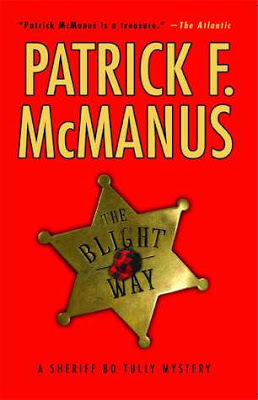 BORDER PATROL AGENT DOLPH MARTINEZ SERIES JIM SANDERSONIn the thirty years that Jim Sanderson has been writing seriously, he has been given many labels. He went from being an "aspiring writer" to a "working class, Texas" writer when he won the Kenneth Patchen Prize and had his short story collection, Semi-Private Rooms, published. With the publication of his essay collection, A West Texas Soapbox, he became a Texas humorist and essayist. When he won the 1997 Frank Waters Prize, he was a new "rural Southwestern literary writer." When the novel that won that prize, El Camino Del Riocame out with his editor's label as a "mystery" and was subsequently reviewed in the Washington Post and New York Times as a mystery, he became a mystery writer. With the University of New Mexico Press's publication of two more novels, Safe Delivery and La Mordida, he became a "literary mystery writer." With the publication of Nevin's History (Texas Tech University Press, 2004), he became a "historical writer" or a "Western writer.
BORDER PATROL AGENT DOLPH MARTINEZ SERIES JIM SANDERSONIn the thirty years that Jim Sanderson has been writing seriously, he has been given many labels. He went from being an "aspiring writer" to a "working class, Texas" writer when he won the Kenneth Patchen Prize and had his short story collection, Semi-Private Rooms, published. With the publication of his essay collection, A West Texas Soapbox, he became a Texas humorist and essayist. When he won the 1997 Frank Waters Prize, he was a new "rural Southwestern literary writer." When the novel that won that prize, El Camino Del Riocame out with his editor's label as a "mystery" and was subsequently reviewed in the Washington Post and New York Times as a mystery, he became a mystery writer. With the University of New Mexico Press's publication of two more novels, Safe Delivery and La Mordida, he became a "literary mystery writer." With the publication of Nevin's History (Texas Tech University Press, 2004), he became a "historical writer" or a "Western writer. 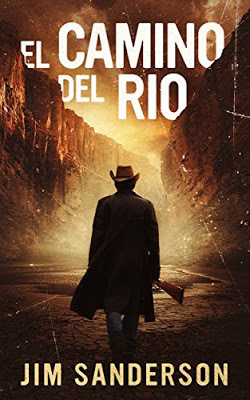 EL CAMINO DEL RIO
Circling buzzards lead U.S. Border Patrol agent Dolph Martinez to the corpse of a man executed in the desert…a murder that shatters the fragile calm in a dusty, Texas town. His investigation pits him against the Mexican Army, the DEA, big-money Houston real estate interests, a Catholic nun who practices voodoo, a revolutionary wanted on both sides of the border, and perhaps deadliest of all, the demons from his own, tortured past.
EL CAMINO DEL RIO
Circling buzzards lead U.S. Border Patrol agent Dolph Martinez to the corpse of a man executed in the desert…a murder that shatters the fragile calm in a dusty, Texas town. His investigation pits him against the Mexican Army, the DEA, big-money Houston real estate interests, a Catholic nun who practices voodoo, a revolutionary wanted on both sides of the border, and perhaps deadliest of all, the demons from his own, tortured past. 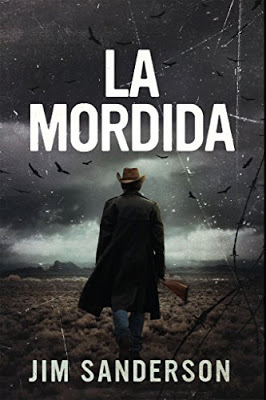 LA MORDIDAThere's Death on Both Sides of the Razor's Edge...Dolph Martinez leads a U.S. Border Patrol task force battling crime and corruption in the empty desert borderlands of Texas and Mexico where la mordida, the payoff, is a way of life. He's a walking embodiment of the violent, cross-cultural clash, his soul torn between the two cultures that make him a very special lawman in an unforgiving place. But now he's become an unwitting pawn in a dark conspiracy that could end with his corpse among the sunbaked bones of the border dead. FBI SPECIAL AGENT MANNY TANNO SERIESC. M. WENDELBOE C. M. Wendelboe is a sheriff’s deputy in Wyoming. He began his law enforcement career shortly after his discharge from the Marines. He had served successful stints as police chief, tactical team member, and other supervisory roles for several agencies during his thirty-eight year career in law enforcement—yet he always has felt most proud of “working the street.” He was a patrol supervisor when he retired to pursue his vocation as a writer. In the 1970s, he assisted federal and tribal law enforcement agencies embroiled in conflicts with American Indian Movement activists in South Dakota towns bordering three Indian reservations, including Pine Ridge. He now lives in Gillette, Wyoming, within a morning’s drive of Devils Tower, Bear Butte, the Black Hills, and the Badlands—tourist sites, which are actually sacred places to the Lakota people. The distance of geography and expanse of time has accorded him an appreciation of their culture and spirituality. His developing awareness of their diverse perspectives on historical and contemporary issues is reflected in the themes of his Spirit Road Mysteries, which feature FBI agent Manny Tanno—a Native American returning to the reservation home he thought he left behind and finds his oldest rival now in charge of the Tribal Police.
LA MORDIDAThere's Death on Both Sides of the Razor's Edge...Dolph Martinez leads a U.S. Border Patrol task force battling crime and corruption in the empty desert borderlands of Texas and Mexico where la mordida, the payoff, is a way of life. He's a walking embodiment of the violent, cross-cultural clash, his soul torn between the two cultures that make him a very special lawman in an unforgiving place. But now he's become an unwitting pawn in a dark conspiracy that could end with his corpse among the sunbaked bones of the border dead. FBI SPECIAL AGENT MANNY TANNO SERIESC. M. WENDELBOE C. M. Wendelboe is a sheriff’s deputy in Wyoming. He began his law enforcement career shortly after his discharge from the Marines. He had served successful stints as police chief, tactical team member, and other supervisory roles for several agencies during his thirty-eight year career in law enforcement—yet he always has felt most proud of “working the street.” He was a patrol supervisor when he retired to pursue his vocation as a writer. In the 1970s, he assisted federal and tribal law enforcement agencies embroiled in conflicts with American Indian Movement activists in South Dakota towns bordering three Indian reservations, including Pine Ridge. He now lives in Gillette, Wyoming, within a morning’s drive of Devils Tower, Bear Butte, the Black Hills, and the Badlands—tourist sites, which are actually sacred places to the Lakota people. The distance of geography and expanse of time has accorded him an appreciation of their culture and spirituality. His developing awareness of their diverse perspectives on historical and contemporary issues is reflected in the themes of his Spirit Road Mysteries, which feature FBI agent Manny Tanno—a Native American returning to the reservation home he thought he left behind and finds his oldest rival now in charge of the Tribal Police.
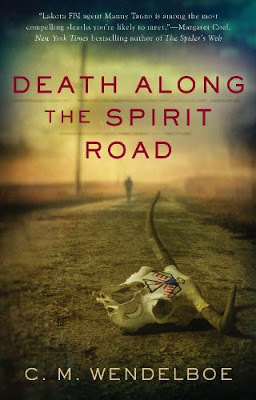 DEATH ALONG THE SPIRIT ROAD
DEATH ALONG THE SPIRIT ROADThe body of local Native American land developer Jason Red Cloud is found on the site for his new resort on the Pine Ridge Reservation. A war club is lodged in his skull-appearing as if someone may have performed a ritual at the crime scene. FBI Special Agent Manny Tanno arrives in Pine Ridge to find that not everything has changed since he left. His former rival, now in charge of the Tribal Police, is just as bitter as ever, and has no intention of making Manny's life easy. And the spirit of Red Cloud haunting Manny's dreams is not much help either, leaving him on his own in hunting down a cold-blooded killer-and one misstep could send him down the spirit road as well.
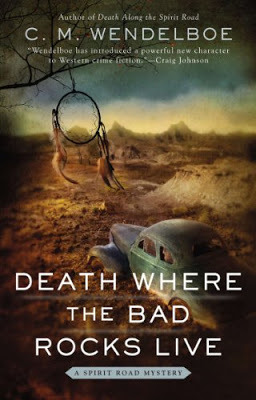 DEATH WHERE THE BAD ROCKS LIVE FBI agent Manny Tanno thought he had left his tribe and the Pine Ridge Reservation behind him years ago. But now with a cold case unearthed in the hot plains sun, he knows that the past never really goes away. In Badlands National Park, there is a desolate area the Lakota refer to as the Stronghold. General Custer called it hell on earth. During World War II, the Army Air Corps used it as a bombing range. At the end of the war, many unexploded ordnances were swallowed up in its sweltering sands. But that’s not all that’s buried there. Sixty-five years after the war, the Sioux tribe has contracted an ordnance removal company to defuse any remaining ammunition in the Stronghold. When the company finds a human arm near a live bomb, Tanno and the Tribal police are called to investigate. As the body is exhumed, two more are discovered. The remains are close together, but the murders were decades apart—and the story behind them is about to blow up.
DEATH WHERE THE BAD ROCKS LIVE FBI agent Manny Tanno thought he had left his tribe and the Pine Ridge Reservation behind him years ago. But now with a cold case unearthed in the hot plains sun, he knows that the past never really goes away. In Badlands National Park, there is a desolate area the Lakota refer to as the Stronghold. General Custer called it hell on earth. During World War II, the Army Air Corps used it as a bombing range. At the end of the war, many unexploded ordnances were swallowed up in its sweltering sands. But that’s not all that’s buried there. Sixty-five years after the war, the Sioux tribe has contracted an ordnance removal company to defuse any remaining ammunition in the Stronghold. When the company finds a human arm near a live bomb, Tanno and the Tribal police are called to investigate. As the body is exhumed, two more are discovered. The remains are close together, but the murders were decades apart—and the story behind them is about to blow up.
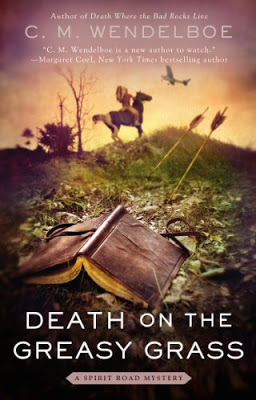 DEATH ON THE GREASY GRASSFBI agent Manny Tanno is taking some much needed R—and—R at the site of the Battle of Little Big Horn. But when a death on the reservation cuts his vacation short, he learns that the secrets of the past have a way of stirring up trouble in the present. As a scout for the legendary General Custer, Crow tribe member Levi Star Dancer kept a journal chronicling his exploits from the Battle of the Greasy Grass onward. Now, the missing journal has been found and the descendants of those mentioned in the account, including Levi’s own, want to keep their family secrets hidden at all costs. Manny’s trip to the Crow Agency Reservation turns out to be ill timed when a reenactor of the Battle of Little Big Horn is killed right in front of him. It turns out the victim was the one who found Levi Star Dancer’s famed diary and was planning on selling it to the highest bidder. And while the dead body is hard to miss, the coveted book is nowhere to be found. Now, Manny has to watch his back while searching for a murderer and the missing journal, because this slippery killer will do anything to make sure the past stays buried. SHERIFF CHRIS CHERRY SERIES
DEATH ON THE GREASY GRASSFBI agent Manny Tanno is taking some much needed R—and—R at the site of the Battle of Little Big Horn. But when a death on the reservation cuts his vacation short, he learns that the secrets of the past have a way of stirring up trouble in the present. As a scout for the legendary General Custer, Crow tribe member Levi Star Dancer kept a journal chronicling his exploits from the Battle of the Greasy Grass onward. Now, the missing journal has been found and the descendants of those mentioned in the account, including Levi’s own, want to keep their family secrets hidden at all costs. Manny’s trip to the Crow Agency Reservation turns out to be ill timed when a reenactor of the Battle of Little Big Horn is killed right in front of him. It turns out the victim was the one who found Levi Star Dancer’s famed diary and was planning on selling it to the highest bidder. And while the dead body is hard to miss, the coveted book is nowhere to be found. Now, Manny has to watch his back while searching for a murderer and the missing journal, because this slippery killer will do anything to make sure the past stays buried. SHERIFF CHRIS CHERRY SERIESJ. TODD SCOTT
J. Todd Scott was born in rural Kentucky and attended college and law school in Virginia, where he set aside an early ambition to write to pursue a career as a federal agent. His assignments have taken him all over the U.S. and the world, but a badge and gun never replaced his passion for books and writing. He now resides in the American Southwest, and when he’s not hunting down very bad men, he’s hard at work on his next book.
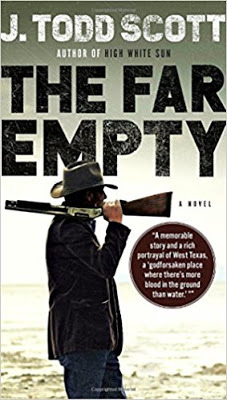 THE FAR EMPTYIn this gritty crime debut set in the stark Texas borderlands, an unearthed skeleton will throw a small town into violent turmoil...Seventeen-year-old Caleb Ross is adrift in the wake of the sudden disappearance of his mother more than a year ago, and is struggling to find his way out of the small Texas border town of Murfee. Chris Cherry is a newly minted sheriff's deputy, a high school football hero who has reluctantly returned to his hometown. When skeletal remains are discovered in the surrounding badlands, the two are inexorably drawn together as their efforts to uncover Murfee's darkest secrets lead them to the same terrifying suspect: Caleb's father and Chris's boss, the charismatic and feared Sheriff Standford "Judge" Ross...Dark, elegiac, and violent, The Far Empty is a modern Western, a story of loss and escape set along the sharp edge of the Texas border. Told by a longtime federal agent who knows the region, it's a debut novel you won't soon forget.
THE FAR EMPTYIn this gritty crime debut set in the stark Texas borderlands, an unearthed skeleton will throw a small town into violent turmoil...Seventeen-year-old Caleb Ross is adrift in the wake of the sudden disappearance of his mother more than a year ago, and is struggling to find his way out of the small Texas border town of Murfee. Chris Cherry is a newly minted sheriff's deputy, a high school football hero who has reluctantly returned to his hometown. When skeletal remains are discovered in the surrounding badlands, the two are inexorably drawn together as their efforts to uncover Murfee's darkest secrets lead them to the same terrifying suspect: Caleb's father and Chris's boss, the charismatic and feared Sheriff Standford "Judge" Ross...Dark, elegiac, and violent, The Far Empty is a modern Western, a story of loss and escape set along the sharp edge of the Texas border. Told by a longtime federal agent who knows the region, it's a debut novel you won't soon forget.
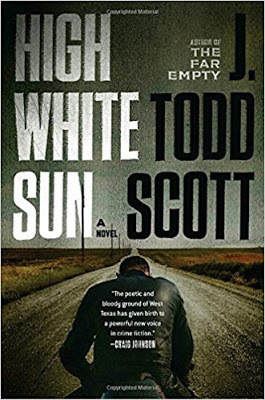 HIGH WHITE SUNEven though the corrupt Sheriff Ross is dead and gone, outlaws still walk free, peace comes at a price, and redemption remains hard to find...In the wake of Sheriff Stanford Ross's death, former deputy Chris Cherry--now Sheriff Cherry--is the new "law" in Big Bend County, yet he still struggles to escape the shadow of that infamous lawman. As Chris tries to remake and modernize his corrupt department, bringing in new deputies, including young America Reynosa and Ben Harper--a hard-edged veteran homicide detective now lured out of retirement--he finds himself constantly staring down a town unwilling to change, friends and enemies unable to let go of the past, and the harsh limits of his badge. But it's only when a local Rio Grande guide is brutally and inexplicably murdered, and America and Ben's ongoing investigation is swept aside by a secretive federal agent, that the novice sheriff truly understands just how tenuous his hold on that badge really is. And as other new threats rise right along with the unforgiving West Texas sun, nothing can prepare Chris for the high cost of crossing dangerous men such as John Wesley Earl, a high-ranking member of the Aryan Brotherhood of Texas and the patriarch of a murderous clan that's descended on Chris's hometown of Murfee; or Thurman Flowers, a part-time pastor and full-time white supremacist hell-bent on founding his violent Church of Purity in the very heart of the Big Bend. Before long, Chris, America, and Ben are outmaneuvered, outnumbered, and outgunned—inexorably drawn into a nearly twenty-year vendetta that began with a murdered Texas Ranger on a dusty highway outside of Sweetwater, and that can only end with fire, blood, and bullets in Murfee's own sun-scorched streets.
HIGH WHITE SUNEven though the corrupt Sheriff Ross is dead and gone, outlaws still walk free, peace comes at a price, and redemption remains hard to find...In the wake of Sheriff Stanford Ross's death, former deputy Chris Cherry--now Sheriff Cherry--is the new "law" in Big Bend County, yet he still struggles to escape the shadow of that infamous lawman. As Chris tries to remake and modernize his corrupt department, bringing in new deputies, including young America Reynosa and Ben Harper--a hard-edged veteran homicide detective now lured out of retirement--he finds himself constantly staring down a town unwilling to change, friends and enemies unable to let go of the past, and the harsh limits of his badge. But it's only when a local Rio Grande guide is brutally and inexplicably murdered, and America and Ben's ongoing investigation is swept aside by a secretive federal agent, that the novice sheriff truly understands just how tenuous his hold on that badge really is. And as other new threats rise right along with the unforgiving West Texas sun, nothing can prepare Chris for the high cost of crossing dangerous men such as John Wesley Earl, a high-ranking member of the Aryan Brotherhood of Texas and the patriarch of a murderous clan that's descended on Chris's hometown of Murfee; or Thurman Flowers, a part-time pastor and full-time white supremacist hell-bent on founding his violent Church of Purity in the very heart of the Big Bend. Before long, Chris, America, and Ben are outmaneuvered, outnumbered, and outgunned—inexorably drawn into a nearly twenty-year vendetta that began with a murdered Texas Ranger on a dusty highway outside of Sweetwater, and that can only end with fire, blood, and bullets in Murfee's own sun-scorched streets.
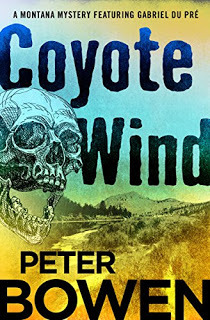
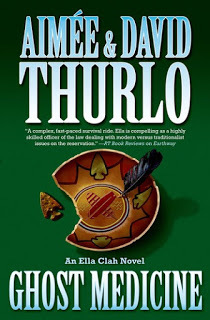 OTHER SUGGESTED
OTHER SUGGESTED CURRENT DAY WESTERN SERIESELLA CLAH SERIESBY AIMÉE AND DAVID THURLOCAITLIN STRONG SERIES
BY JON LAND
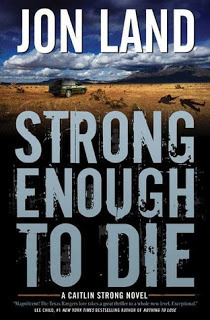 GABRIEL DU PRÉ SERIES BY PETER BOWENWIND RIVER SERIES BY MARGARET COELHOWARD MOON DEER SERIES
GABRIEL DU PRÉ SERIES BY PETER BOWENWIND RIVER SERIES BY MARGARET COELHOWARD MOON DEER SERIES BY ROBERT WESTBROOK
GAME WARDEN JOE PICKETT SERIES
BY C. J. BOX
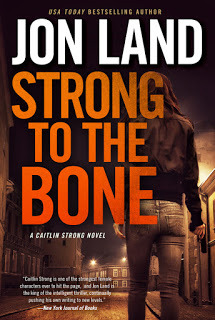
Published on March 21, 2018 23:24
March 19, 2018
TRUE GRIT
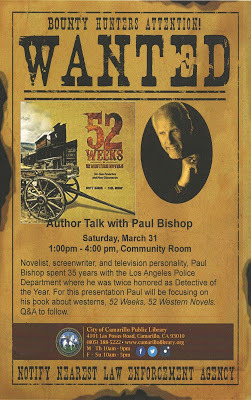
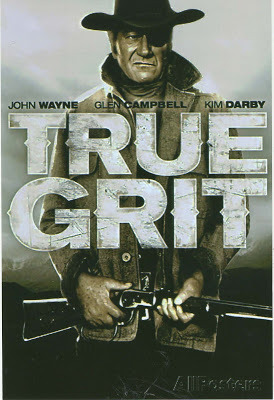 TRUE GRITComing up in two weeks, I'll be talking True Grit (the novel and the movies) at the Camarillo Library prior to hosting a free screening of the original True Grit starring John Wayne.
TRUE GRITComing up in two weeks, I'll be talking True Grit (the novel and the movies) at the Camarillo Library prior to hosting a free screening of the original True Grit starring John Wayne.1pm-4pm Saturday March 31, 2018Camarillo LibraryCommunity Room


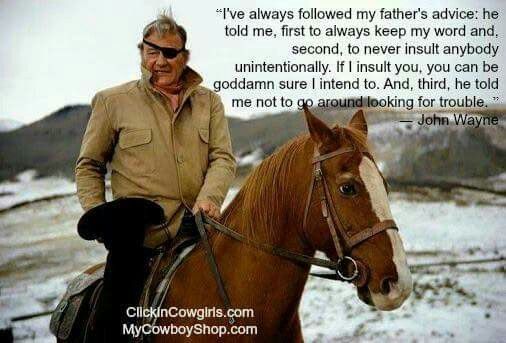


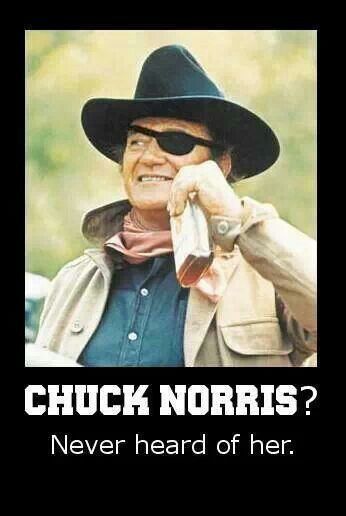
Published on March 19, 2018 12:05
March 17, 2018
WORDSLINGERS AND HOT LEAD
 WORDSLINGERS AND HOT LEAD
WORDSLINGERS AND HOT LEADJustin Marriott and I had a blast working long distance via email putting together the premiere issue of Hot Lead: The Fanzine of Vintage Western Paperbacks. We had so much material, the first draft of the issue ran to 100 pages. We wisely decided to split the material into two issues and push back the original Issue #2 line-up to Issue #3 (you can see where this is going).
Despite the higher cost per issue ($9.99 in the USA), we believed printing the interior illustrations and exterior covers in full-color was the only choice. We wanted to fill the pages with pertinent articles, reviews, and interviews, but also make the zine visually appealing—especially as we are huge fans of the vintage covers so much ourselves.
And therein lies the joy of Hot Lead for Justin, myself, and or other contributors. Hot Lead is a throwback to the days of fanzines—magazines produced by fans for fans in which appreciation of the genre trumps the bells and whistles of the professional newsstand magazines known as slicks. Fanzines are for those of us in the trenches...quick reading with great insights into the genres we love.
Fanzines are also notorious for being irregularly published. It's the Zen of the Fanzine, and we embrace it...We have started Hot Lead with the best of intentions—2018 should see 3 published issues—but it is a labor of love produced in the best tradition of DIY Kitchen Table Publishing. We’ll keep you posted.
Meanwhile, I have received my first physical copy of Hot Lead in the mail to day and...WOW! It's everything I hoped it would be and more. Our goal is for other Western fans to find as much fun within the pages of Hot Lead as we do...
Published on March 17, 2018 18:47
March 13, 2018
SHERLOCK SQUARED
 SHERLOCK SQUARED If you are a Sherlockian purist, I admire your standards, but please stop reading now. I am not a Sherlock Holmes purist. Heck, I was the one who suggested putting Sherlock in the boxing ring—An inspiration brought to life by the masterful Sherlockian pastiche scribe Andrew Salmon in three Fight Card: Sherlock Holmes novels (see
Queensberry Rules: The Fight Card Sherlock Holmes Omnibus
for a complete collection). The Guy Ritchie directed, Robert Downey Jr. starring, Sherlock movies, the Benedict Cumberbatch modern day Sherlock, the Jonny Lee Miller Sherlock of Elementary, I enjoy them all and many more.
SHERLOCK SQUARED If you are a Sherlockian purist, I admire your standards, but please stop reading now. I am not a Sherlock Holmes purist. Heck, I was the one who suggested putting Sherlock in the boxing ring—An inspiration brought to life by the masterful Sherlockian pastiche scribe Andrew Salmon in three Fight Card: Sherlock Holmes novels (see
Queensberry Rules: The Fight Card Sherlock Holmes Omnibus
for a complete collection). The Guy Ritchie directed, Robert Downey Jr. starring, Sherlock movies, the Benedict Cumberbatch modern day Sherlock, the Jonny Lee Miller Sherlock of Elementary, I enjoy them all and many more.
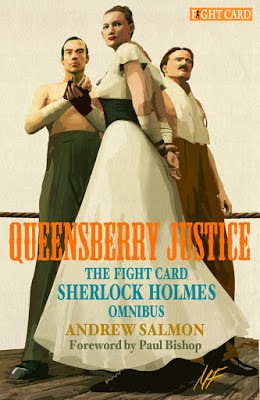 There have been uncountable variations on the Holmes theme, some brilliant, some terrible, most mundane. The most singular characteristic of Sherlock Holmes is how adaptable the world’s greatest consulting detective can be while still retaining a recognizable version of Sir Conan Doyle’s archetype. The background can change. The time period can change. The species can change—there have be mouse Sherlocks, vegetable Sherlocks, and even garden gnome Sherlocks. Actors’ and their interpretations of Sherlock can change like underwear. The medium used to deliver Sherlock can change—from short-stories to novels to plays to comics to movies to television to YouTube videos. Any or all of these things can change, but Sherlock remains constant—our rock in a world gone mad. I’m always willing to give any new Sherlockian iteration a chance—even the current gender switching going on with Watson and with Sherlock himself, or herself—whatever. The first female Sherlock I encountered is in the ongoing contemporary young adult novels featuring the teenage Charlotte Holmes and her friend Jamie Watson. I found the trilogy of novels (a fourth is on the way) written by Brittany Cavallaro compelling and the nature of Holmes captured quite perfectly in Charlotte. But there is another Charlotte Holmes, this one Victorian set and written by Sherry Thomas, with currently three books in the series. In another variation, we meet the daughter of Sherlock’s Holmes—and Irene Adler (who else)—in two novels by Leonard Goldberg. But the distaff Sherlock isn’t confined to the page. HBO Asia will be releasing Miss Sherlock in 20 countries this April. There is also an unsold pilot, Herlock, available on YouTube along with an unrelated short film, Herlock: The Parody. If all of this is blasphemy to you, I warned you ahead of time to stop reading. But for Sherlock fans willing to stretch, some of you will enjoy some of these interpretations and perhaps be unmoved by others. The joy is in knowing the game is always afoot...
There have been uncountable variations on the Holmes theme, some brilliant, some terrible, most mundane. The most singular characteristic of Sherlock Holmes is how adaptable the world’s greatest consulting detective can be while still retaining a recognizable version of Sir Conan Doyle’s archetype. The background can change. The time period can change. The species can change—there have be mouse Sherlocks, vegetable Sherlocks, and even garden gnome Sherlocks. Actors’ and their interpretations of Sherlock can change like underwear. The medium used to deliver Sherlock can change—from short-stories to novels to plays to comics to movies to television to YouTube videos. Any or all of these things can change, but Sherlock remains constant—our rock in a world gone mad. I’m always willing to give any new Sherlockian iteration a chance—even the current gender switching going on with Watson and with Sherlock himself, or herself—whatever. The first female Sherlock I encountered is in the ongoing contemporary young adult novels featuring the teenage Charlotte Holmes and her friend Jamie Watson. I found the trilogy of novels (a fourth is on the way) written by Brittany Cavallaro compelling and the nature of Holmes captured quite perfectly in Charlotte. But there is another Charlotte Holmes, this one Victorian set and written by Sherry Thomas, with currently three books in the series. In another variation, we meet the daughter of Sherlock’s Holmes—and Irene Adler (who else)—in two novels by Leonard Goldberg. But the distaff Sherlock isn’t confined to the page. HBO Asia will be releasing Miss Sherlock in 20 countries this April. There is also an unsold pilot, Herlock, available on YouTube along with an unrelated short film, Herlock: The Parody. If all of this is blasphemy to you, I warned you ahead of time to stop reading. But for Sherlock fans willing to stretch, some of you will enjoy some of these interpretations and perhaps be unmoved by others. The joy is in knowing the game is always afoot... THE CHARLOTTE HOLMES SERIESBRITTANY CAVALLARO
THE CHARLOTTE HOLMES SERIESBRITTANY CAVALLARO
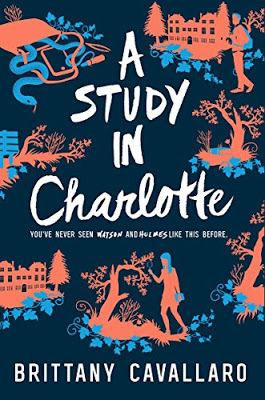 A STUDY IN CHARLOTTE
Jamie Watson has always been intrigued by Charlotte Holmes; after all, their great-great-great-grandfathers are one of the most infamous pairs in history. But the Holmes family has always been odd, and Charlotte is no exception. She’s inherited Sherlock’s volatility and some of his vices—and when Jamie and Charlotte end up at the same Connecticut boarding school, Charlotte makes it clear she’s not looking for friends...But when a student they both have a history with dies under suspicious circumstances, ripped straight from the most terrifying of the Sherlock Holmes stories, Jamie can no longer afford to keep his distance. Danger is mounting and nowhere is safe—and the only people they can trust are each other...
A STUDY IN CHARLOTTE
Jamie Watson has always been intrigued by Charlotte Holmes; after all, their great-great-great-grandfathers are one of the most infamous pairs in history. But the Holmes family has always been odd, and Charlotte is no exception. She’s inherited Sherlock’s volatility and some of his vices—and when Jamie and Charlotte end up at the same Connecticut boarding school, Charlotte makes it clear she’s not looking for friends...But when a student they both have a history with dies under suspicious circumstances, ripped straight from the most terrifying of the Sherlock Holmes stories, Jamie can no longer afford to keep his distance. Danger is mounting and nowhere is safe—and the only people they can trust are each other...
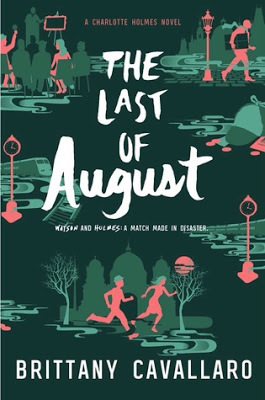 THE LAST OF AUGUST
Jamie Watson and Charlotte Holmes are in a chase across Europe to untangle a web of shocking truths about the Holmes and Moriarty families...Jamie and Charlotte are looking for a winter break reprieve in Sussex after a fall semester that almost got them killed. But nothing about their time off is proving simple, including Holmes and Watson’s growing feelings for each other. When Charlotte’s beloved Uncle Leander goes missing from the Holmes estate—after being oddly private about his latest assignment in a German art forgery ring—the game is afoot once again, and Charlotte throws herself into a search for answers...So begins a dangerous race through the gritty underground scene in Berlin and glittering art houses in Prague, where Holmes and Watson discover that this complicated case might change everything they know about their families, themselves, and each other.
THE LAST OF AUGUST
Jamie Watson and Charlotte Holmes are in a chase across Europe to untangle a web of shocking truths about the Holmes and Moriarty families...Jamie and Charlotte are looking for a winter break reprieve in Sussex after a fall semester that almost got them killed. But nothing about their time off is proving simple, including Holmes and Watson’s growing feelings for each other. When Charlotte’s beloved Uncle Leander goes missing from the Holmes estate—after being oddly private about his latest assignment in a German art forgery ring—the game is afoot once again, and Charlotte throws herself into a search for answers...So begins a dangerous race through the gritty underground scene in Berlin and glittering art houses in Prague, where Holmes and Watson discover that this complicated case might change everything they know about their families, themselves, and each other.
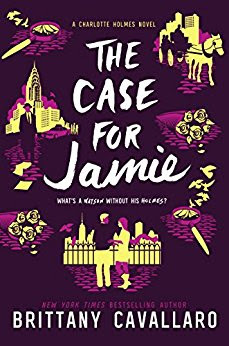 THE CASE FOR JAMIE
It’s been a year since the shocking events recounted in The Last of August, and Jamie and Charlotte haven’t spoken...Jamie is going through the motions at Sherringford, trying to finish his senior year without incident, with a nice girlfriend he can’t seem to fall for...Charlotte is on the run, from Lucien Moriarty and from her own mistakes. No one has seen her since that fateful night on the lawn in Sussex—and Charlotte wants it that way. She knows she isn’t safe to be around. She knows her Watson can’t forgive her...Holmes and Watson may not be looking to reconcile, but when strange things start happening, it’s clear that someone wants the team back together. Someone who has been quietly observing them both. Making plans. Biding their time...Someone who wants to see one of them suffer and the other one dead.
THE CASE FOR JAMIE
It’s been a year since the shocking events recounted in The Last of August, and Jamie and Charlotte haven’t spoken...Jamie is going through the motions at Sherringford, trying to finish his senior year without incident, with a nice girlfriend he can’t seem to fall for...Charlotte is on the run, from Lucien Moriarty and from her own mistakes. No one has seen her since that fateful night on the lawn in Sussex—and Charlotte wants it that way. She knows she isn’t safe to be around. She knows her Watson can’t forgive her...Holmes and Watson may not be looking to reconcile, but when strange things start happening, it’s clear that someone wants the team back together. Someone who has been quietly observing them both. Making plans. Biding their time...Someone who wants to see one of them suffer and the other one dead.
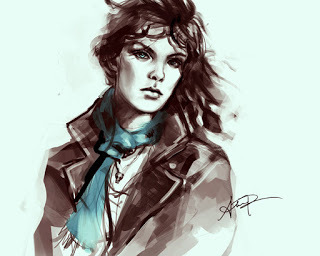 THE LADY SHERLOCK SERIESSHERRY THOMAS
THE LADY SHERLOCK SERIESSHERRY THOMAS
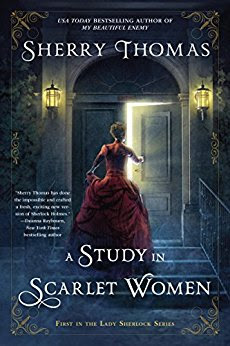 A STUDY IN SCARLET WOMEN
With her inquisitive mind, Charlotte Holmes has never felt comfortable with the demureness expected of the fairer sex in upper class society. But even she never thought that she would become a social pariah, an outcast fending for herself on the mean streets of London...When the city is struck by a trio of unexpected deaths and suspicion falls on her sister and her father, Charlotte is desperate to find the true culprits and clear the family name. She’ll have help from friends new and old—a kind-hearted widow, a police inspector, and a man who has long loved her...But in the end, it will be up to Charlotte, under the assumed name Sherlock Holmes, to challenge society’s expectations and match wits against an unseen mastermind.
A STUDY IN SCARLET WOMEN
With her inquisitive mind, Charlotte Holmes has never felt comfortable with the demureness expected of the fairer sex in upper class society. But even she never thought that she would become a social pariah, an outcast fending for herself on the mean streets of London...When the city is struck by a trio of unexpected deaths and suspicion falls on her sister and her father, Charlotte is desperate to find the true culprits and clear the family name. She’ll have help from friends new and old—a kind-hearted widow, a police inspector, and a man who has long loved her...But in the end, it will be up to Charlotte, under the assumed name Sherlock Holmes, to challenge society’s expectations and match wits against an unseen mastermind.
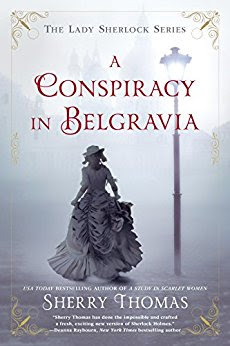 A CONSPIRACY IN BELGRAVIA
Being shunned by Society gives Charlotte Holmes the time and freedom to put her extraordinary powers of deduction to good use. As Sherlock Holmes, consulting detective, aided by the capable Mrs. Watson, she’s had great success helping with all manner of inquiries, but she’s not prepared for the new client who arrives at her Upper Baker Street office…Lady Ingram, wife of Charlotte’s dear friend and benefactor, wants Sherlock Holmes to find her first love, who failed to show up at their annual rendezvous. Matters of loyalty and discretion aside, the case becomes even more personal for Charlotte as the missing man is none other than Myron Finch, her illegitimate half brother...In the meanwhile, Charlotte wrestles with a surprising proposal of marriage, a mysterious stranger woos her sister Livia, and an unidentified body surfaces where least expected. Charlotte’s investigative prowess is challenged as never before: Can she find her brother in time—or will he, too, end up as a nameless corpse somewhere in the belly of London.
A CONSPIRACY IN BELGRAVIA
Being shunned by Society gives Charlotte Holmes the time and freedom to put her extraordinary powers of deduction to good use. As Sherlock Holmes, consulting detective, aided by the capable Mrs. Watson, she’s had great success helping with all manner of inquiries, but she’s not prepared for the new client who arrives at her Upper Baker Street office…Lady Ingram, wife of Charlotte’s dear friend and benefactor, wants Sherlock Holmes to find her first love, who failed to show up at their annual rendezvous. Matters of loyalty and discretion aside, the case becomes even more personal for Charlotte as the missing man is none other than Myron Finch, her illegitimate half brother...In the meanwhile, Charlotte wrestles with a surprising proposal of marriage, a mysterious stranger woos her sister Livia, and an unidentified body surfaces where least expected. Charlotte’s investigative prowess is challenged as never before: Can she find her brother in time—or will he, too, end up as a nameless corpse somewhere in the belly of London.
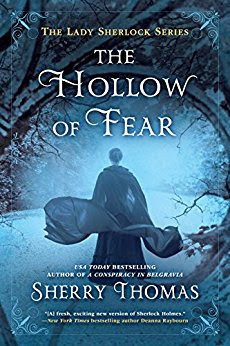 THE HOLLOW OF FEAR
Under the cover of Sherlock Holmes, consulting detective, Charlotte Holmes puts her extraordinary powers of deduction to good use. Aided by the capable Mrs. Watson, Charlotte draws those in need to her and makes it her business to know what other people don't. When her dear friend Lord Ingram stands accused of the murder of his estranged wife, Charlotte goes under disguise to help prove his innocence to Scotland Yard.
THE HOLLOW OF FEAR
Under the cover of Sherlock Holmes, consulting detective, Charlotte Holmes puts her extraordinary powers of deduction to good use. Aided by the capable Mrs. Watson, Charlotte draws those in need to her and makes it her business to know what other people don't. When her dear friend Lord Ingram stands accused of the murder of his estranged wife, Charlotte goes under disguise to help prove his innocence to Scotland Yard.
 THE DAUGHTER OF SHERLOCK HOLMES MYSTERIESLEONARD GOLDBERG
THE DAUGHTER OF SHERLOCK HOLMES MYSTERIESLEONARD GOLDBERG
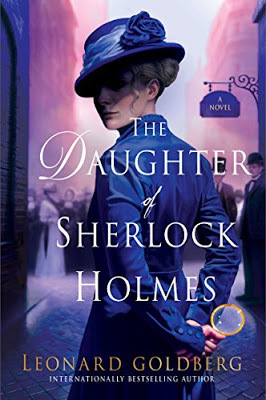 THE DAUGHTER OF SHERLOCK HOLMES
1914. Joanna Blalock’s keen mind and incredible insight lead her to become a highly-skilled nurse, one of the few professions that allow her to use her finely-tuned brain. But when she and her ten-year-old son witness a man fall to his death, apparently by suicide, they are visited by the elderly Dr. John Watson and his charming, handsome son, Dr. John Watson Jr. Impressed by her forensic skills, they invite her to become the third member of their investigative team...Caught up in a Holmesian mystery that spans from hidden treasure to the Second Afghan War of 1878-1880, Joanna and her companions must devise an ingenious plan to catch a murderer in the act while dodging familiar culprits, Scotland Yard, and members of the British aristocracy. Unbeknownst to her, Joanna harbors a mystery of her own. The product of a one-time assignation between the now dead Sherlock Holmes and Irene Adler, the only woman to ever outwit the famous detective, Joanna has unwittingly inherited her parents’ deductive genius.
THE DAUGHTER OF SHERLOCK HOLMES
1914. Joanna Blalock’s keen mind and incredible insight lead her to become a highly-skilled nurse, one of the few professions that allow her to use her finely-tuned brain. But when she and her ten-year-old son witness a man fall to his death, apparently by suicide, they are visited by the elderly Dr. John Watson and his charming, handsome son, Dr. John Watson Jr. Impressed by her forensic skills, they invite her to become the third member of their investigative team...Caught up in a Holmesian mystery that spans from hidden treasure to the Second Afghan War of 1878-1880, Joanna and her companions must devise an ingenious plan to catch a murderer in the act while dodging familiar culprits, Scotland Yard, and members of the British aristocracy. Unbeknownst to her, Joanna harbors a mystery of her own. The product of a one-time assignation between the now dead Sherlock Holmes and Irene Adler, the only woman to ever outwit the famous detective, Joanna has unwittingly inherited her parents’ deductive genius.
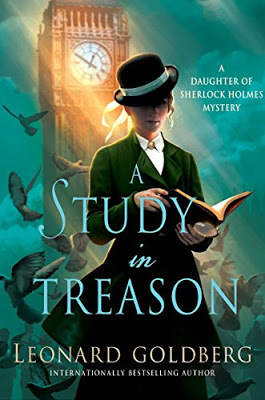 A STUDY IN TREASON
The following case has not previously been disclosed to the public due to the sensitive information on foreign affairs. All those involved were previously bound by the Official Secrets Act. With the passage of time and the onset of the Great War, these impediments have been removed and the story can now be safely told...When an executed original of a secret treaty between England and France, known as the French Treaty, is stolen from the country estate of Lord Halifax, Scotland Yard asks Joanna, Dr. John Watson, Jr., and Dr. John Watson, Sr. to use their detective skills to participate in the hunt for the missing treaty. As the government becomes more restless to find the missing document and traditional investigative means fail to turn up the culprit, Joanna is forced to devise a clever plan to trap the thief and recover the missing treaty...Told from the point of view of Dr. John Watson, Jr. in a style similar to the original Sherlock Holmes stories, A Study in Treason is based partly on facts in our world and partly on the facts left to us by Sir Arthur Conan Doyle...This cunning locked room mystery is sure to be enjoyed by fans of Sherlock Holmes.
A STUDY IN TREASON
The following case has not previously been disclosed to the public due to the sensitive information on foreign affairs. All those involved were previously bound by the Official Secrets Act. With the passage of time and the onset of the Great War, these impediments have been removed and the story can now be safely told...When an executed original of a secret treaty between England and France, known as the French Treaty, is stolen from the country estate of Lord Halifax, Scotland Yard asks Joanna, Dr. John Watson, Jr., and Dr. John Watson, Sr. to use their detective skills to participate in the hunt for the missing treaty. As the government becomes more restless to find the missing document and traditional investigative means fail to turn up the culprit, Joanna is forced to devise a clever plan to trap the thief and recover the missing treaty...Told from the point of view of Dr. John Watson, Jr. in a style similar to the original Sherlock Holmes stories, A Study in Treason is based partly on facts in our world and partly on the facts left to us by Sir Arthur Conan Doyle...This cunning locked room mystery is sure to be enjoyed by fans of Sherlock Holmes.
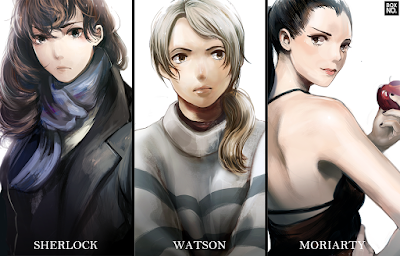 SHERLOCK IS A WOMAN The television screen has Lucy Liu as Watson (and a fine job she does), but gender switching Holmes on the small screen has not yet happened—or has it? In April, 2018, HBO Asia will be releasing Miss Sherlock in twenty countries. The eight-part drama will pay homage to the classic novels by Sir Arthur Conan Doyle but will be set in modern-day Tokyo with both lead characters played by Japanese women – Yuko Takeuchi as Sherlock and Shihori Kanjiya as Watson (or Dr Wato Tachibana).
SHERLOCK IS A WOMAN The television screen has Lucy Liu as Watson (and a fine job she does), but gender switching Holmes on the small screen has not yet happened—or has it? In April, 2018, HBO Asia will be releasing Miss Sherlock in twenty countries. The eight-part drama will pay homage to the classic novels by Sir Arthur Conan Doyle but will be set in modern-day Tokyo with both lead characters played by Japanese women – Yuko Takeuchi as Sherlock and Shihori Kanjiya as Watson (or Dr Wato Tachibana).
 MISS HOLMES
MISS HOLMESHERLOCKFollowing inspiration provided by his wife, Karen Dill-Shackleford), playwright and screenwriter Lee Shackleford (who starred as Holmes off Broadway in a play he wrote called Holmes & Watson) wrote the script for a TV pilot with a female Holmes and Watson. He then joined forces with colleague David Duncan who found and cast the actresses—Gia Mora as Sheridan Hume, and Alana Jordan as Jonny Watts...Below is the pilot episode, Silver Blade...
Published on March 13, 2018 15:09
March 8, 2018
LESSONS LEARNED FROM THE MEN'S ADVENTURE GENRE
 LESSONS LEARNED FROM THE MEN'S ADVENTURE GENRE
LESSONS LEARNED FROM THE MEN'S ADVENTURE GENRERecently a thread began on The Men’s Adventure Series Paperbacks of the 70s & 80s Facebook group regarding lessons learned from the men's adventure genre. What follows are some of the entries from group members...
 1. I am the master of my fate.
1. I am the master of my fate.2. If I do not like my present situation, it's on me to change it.
3. There's no guarantee the change will be for the better.
4. But the status quo is guaranteed to get worse if I do nothing.
5. What things do I need to change the world for the better? Courage, purpose, wisdom, and compassion.
6. The truest form of love is to stand into danger for those who can't.
7. In mainstream fiction, when all is said and done, a great deal is said and very little done. In genre fiction, not much is said, a great deal is done. And I know which one speaks to me.
 8. Chicks dig scars.
8. Chicks dig scars.9. Every highly skilled mercenary has had training in wine selection, classical music appreciation, and formal wardrobe selection. They are also incredibly wealthy, though each one knows they will never live long enough to enjoy their money fully.
10. Gasoline remains viable for 100 years or more, as do rubber tires and car batteries.
11. If your mercenary team is going to be successful, it must be comprised of members from a wide range of military units as well as race/color/nationality.
12. Radiation from a nuclear blast can create giant, mutated monsters within a few weeks.
13. A thrown knife, at any range, is instantly fatal.
 14. Curare is commonly available and instantly recognizable...by taste.
14. Curare is commonly available and instantly recognizable...by taste.15. For being a supposed secret art, ninjas are everywhere.
16. Unlimited ammunition is always available.
17. Sexy large breasted victims are always the only kind in need of rescue.
 18. The faithful, yet weak and desperate, companion you pick up on your adventures, always saves your ass in a pinch.
18. The faithful, yet weak and desperate, companion you pick up on your adventures, always saves your ass in a pinch.19. Cars will magically start when being hotwired.
20. Explosives will always go off in the nick of time.
 21. Look beneath the surface.
21. Look beneath the surface.22. Choose a side.
23. Friendship is good, greed and dominating other people is bad.
 24. You might lose a battle, but you can still win the war if you remain cool under fire.
24. You might lose a battle, but you can still win the war if you remain cool under fire.25. In the end, the key to victory is courage, caring and some smart-ass remarks.
26. Men's Adventure genre art is awesome.
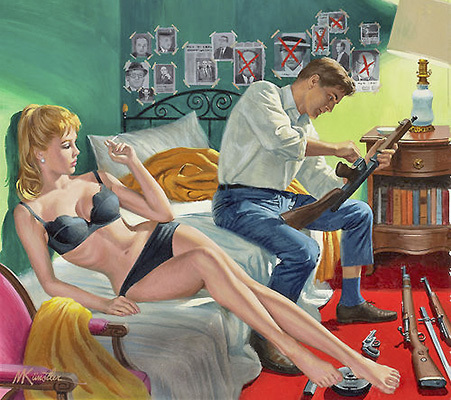 Thx to Ken Prescott, Jim Cobb, Tony Bacon, and Mark Ellis
Thx to Ken Prescott, Jim Cobb, Tony Bacon, and Mark Ellis
Published on March 08, 2018 10:11
March 6, 2018
TRUE GRIT
 TRUE GRITOn Saturday, March 31st starting at 1pm in the Camarillo Library Community Room, I’ll be talking True Grit—the book and the movies—prior to a screening of the original film version starring John Wayne. There will be a Q&A following the screening. Signed copies of 52 Weeks • 52 Western Novels and other selected titles will be available for purchase...
TRUE GRITOn Saturday, March 31st starting at 1pm in the Camarillo Library Community Room, I’ll be talking True Grit—the book and the movies—prior to a screening of the original film version starring John Wayne. There will be a Q&A following the screening. Signed copies of 52 Weeks • 52 Western Novels and other selected titles will be available for purchase...
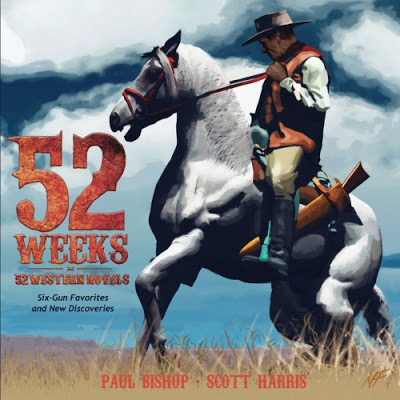
Published on March 06, 2018 14:33
February 19, 2018
SECOND-HAND SECRETS
 SECOND-HAND SECRETS
SECOND-HAND SECRETSOne of the reasons I love used books is they sometimes hide second-hand secrets within their pages. Frequently these secrets are in the form of margin annotations, jotted down things to do lists, phone numbers, or random scribbles. Other secrets can be uncovered when a used book is found to be the unintended archive for disposable scraps such as old grocery lists or gas receipts, occasional unpaid bills, airplane boarding passes, traffic tickets, or other paper detritus.
Most often these items are employed as makeshift bookmarks, either haphazardly left between pages, or purposely placed to mark a finished reading location of the book’s previous owner. Whatever form these ethereal doodlings or tangible ephemera take, they can all be found residing in used books picked up from Friends of the Library exchanges, local used bookstores, the stock of Internet book dealers, or marked down for quick sale in local garage sales, or the equivalent.
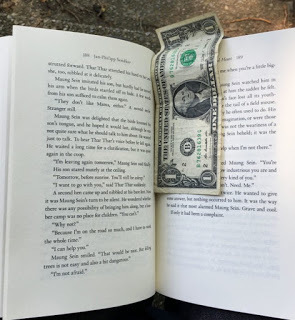 Several times, I’ve found dollar bills slipped between a paperback’s pages. Once, I had the luck of the devil, finding a greenback twenty sandwiched between the last sheet of a paperback and it’s cover. Clearly, it had skittered in by accident, but as I held it, I conjured up groundless speculation about the book’s previous owner. Had he or she searched everywhere for the twenty dollar bill? Was it needed to finish paying the rent or face eviction? Or was the previous reader so financially irresponsible they actually used twenty dollar bills as bookmarks, and lighted cigars with a handy stack of Benjamins?
Several times, I’ve found dollar bills slipped between a paperback’s pages. Once, I had the luck of the devil, finding a greenback twenty sandwiched between the last sheet of a paperback and it’s cover. Clearly, it had skittered in by accident, but as I held it, I conjured up groundless speculation about the book’s previous owner. Had he or she searched everywhere for the twenty dollar bill? Was it needed to finish paying the rent or face eviction? Or was the previous reader so financially irresponsible they actually used twenty dollar bills as bookmarks, and lighted cigars with a handy stack of Benjamins?Two individuals of my acquaintance found lottery tickets hidden inside scruffy paperbacks. One of the dog-eared tomes came from the crowded shelves of a Goodwill thrift store—the place where famous authors’ bestsellers go to die. The lottery ticket was a scratcher. It had been torn in half—clearly a bad investment of a hard earned dollar. It was as worthless as the bloated prose of the modern-day doorstop techno-thriller in which it was found. However, it did mask a viable secret.
The thrift store where my acquaintance bought the book was in Los Angeles, while the lottery scratcher was bought in the state of Michigan. Hmmm—what happened on the cross-country journey? Was the book originally bought in Michigan and read during the trip? Or if it was purchased out west, what was the story behind the valueless lottery ticket? And what if the book had been through a series of foster homes before my friend rescued it? When and where did the book and the lottery ticket get married? Inquiring minds want to know.
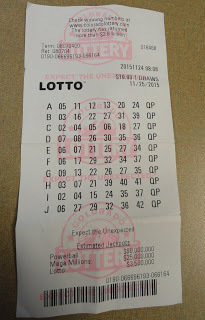 The other lottery ticket, was found in a cover-curled copy of a Travis McGee adventure. The book had been scrounged for a dime from a shady looking vendor at a swap meet. The previous owner of this lottery ticket—presumably, the one-time owner of the Travis McGee novel—had spent ten dollars for the ten random sets of numbers emblazoned upon it, each giving the purchaser a chance to win the California Lottery Mega Millions.
The other lottery ticket, was found in a cover-curled copy of a Travis McGee adventure. The book had been scrounged for a dime from a shady looking vendor at a swap meet. The previous owner of this lottery ticket—presumably, the one-time owner of the Travis McGee novel—had spent ten dollars for the ten random sets of numbers emblazoned upon it, each giving the purchaser a chance to win the California Lottery Mega Millions. The ticket was pristine, appearing to have never been taken back to the local stop-and-rob to see if any of the numbers were winners. It might have been worth millions. My friend, however, chose not to find out. Instead, he put it in a small frame, which he placed on his desk next to the obligatory photo of his wife and twins. He claims he gets more pleasure from daydreaming about the possibilities of being mega rich than having his fantasy shattered by finding out the numbers are all losers.
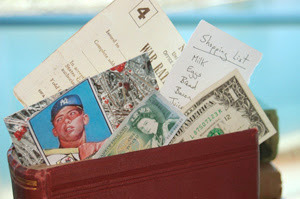 Most items found in used books don’t carry the possibility of millions, or even of being worth the equivalent of a beer and a burger. There is negligible, if any, monetary value attached to these items. No secrets important enough to bring down political regimes or pointers to buried treasure have ever been documented. However, through the use of imagination, they can become a bookaholic’s armchair Indiana Jones adventure.
Most items found in used books don’t carry the possibility of millions, or even of being worth the equivalent of a beer and a burger. There is negligible, if any, monetary value attached to these items. No secrets important enough to bring down political regimes or pointers to buried treasure have ever been documented. However, through the use of imagination, they can become a bookaholic’s armchair Indiana Jones adventure. Is this flirting with ridiculous minutia and off-the-wall Sherlockian deductions absurd? Absolutely—but it’s all part of the fun for those fascinated by these articles. Acknowledging the whimsy of this process allows guilt free, unsubstantiated, theorizing and guesswork to proceed with wild abandon.
Among book fiends there is a heirarchcy of significance applied to these items. The older the item—especially if it predates the book in which it is found—the higher it’s intrinsic curiosity. If clues about a book’s previous owner can be gleaned, you have discovered a horde of plunder. The gold standard of these items would be lost love letters or photographs.
Correspondence and snapshots easily lend themselves to extrapolation. But what can be revealed by a simple supermarket receipt used as a temporary bookmark? Can anything be inferred from date and time printed on it? Was it simply a random day on the calendar, or was it a national holiday, or Valentine’s Day, or perhaps a date of significance only to the book owner. Possibly the purchases reveal more.
The date of a national holiday might have hot dogs and buns, mustard, and soda, or charcoal and lighter fluid purchases. This would indicate a social gathering, but was it with friends, family, or obligatory co-workers? Last minute flowers and a quickly grabbed Hallmark sentiment might be there on a receipt dated February 14th. It’s easy to infer a certain desperation from those items. Candles, cake, ice-cream, and balloons could give credence to a birthday celebration—but what turning of a year is being celebrated? A child’s, a teen’s, somebody who needs the fire department on site before their candles are set afire?
Maybe there is no significance which can be attached to the date and time, but are the items purchased staples like bread and milk, or are they beer, chips, and other party items? What would you conclude if the items were baby food, Pedialyte, and extra strength Tylenol? How about Ben & Jerry’s, generic tampons, and Midol bought from a 7/11 store at midnight?
At one time in the distance past, I was a collector of first editions—a dreaded purist. I distained all scribblings inside a book other than the author’s signature without any personalizations. At one point, however, I realized these unsullied tomes were soulless albatrosses. As I gradually moved them on from my bookshelves, I gained an appreciation for the joys of previously read paperbacks with garish covers, unpretentious expectations, and the crinkled crow’s feet of character. With this new attitude came an appreciation of the written scars found inside books and the further uncovering of found items with second-hand secrets.
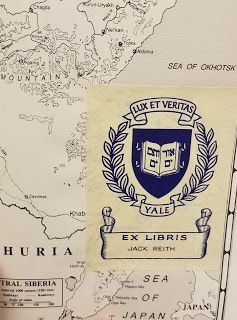 I recently came across a bookplate (those sticky narcissistic declarations of book ownership) in a used copy of Louis L’Amour’s Last Of The Breed. I once despised these pretentious affectations, but today I find them entertaining. The ornamented scroll work pictured on this example of a bookplate was designed to indicate Jack Reith had attended Yale. Jack had not signed or printed his name on the bookplate. He’d typed it on before sticking it in the book. Any guesses about Jack’s OCD or anal-retentive personality?
I recently came across a bookplate (those sticky narcissistic declarations of book ownership) in a used copy of Louis L’Amour’s Last Of The Breed. I once despised these pretentious affectations, but today I find them entertaining. The ornamented scroll work pictured on this example of a bookplate was designed to indicate Jack Reith had attended Yale. Jack had not signed or printed his name on the bookplate. He’d typed it on before sticking it in the book. Any guesses about Jack’s OCD or anal-retentive personality?The poor man’s versions of bookplates are the return address labels meant for the top left corner of outgoing envelopes. Almost all examples of these small sticky rectangles—usually stuck inside front covers—are the free variety sent out by various charitable organizations. After receiving a dime’s worth of these along with a begging letter, does anyone actually feel guilty enough to donate?
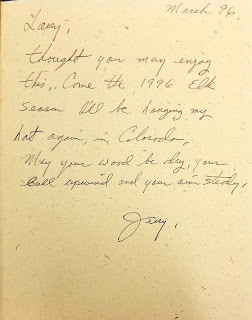 Another Louis L’Amour book, a faux leather copy of The Cherokee Trail, turned up the following interesting sentiment...
Another Louis L’Amour book, a faux leather copy of The Cherokee Trail, turned up the following interesting sentiment...Larry, Thought you might enjoy this...Come the 1996 elk season, I’ll be hanging my hat again in Colorado. May your wood be dry, your bull upwind, and your aim steady...Jerry
Sounds like a serious bromance is going on with a lot of bonding over elk hunting and campfire building. It might have been more interesting if this was written in a copy of Brokeback Mountain.
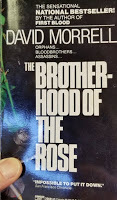 Last week, I came across a perfect example of second-hand secrets when I picked up a copy of David Morrell’s The Brotherhood of the Rose from my local Friends of the Library bookstore. I’d read the novel years ago and could only recall a few plot points, but I did remember how much I had enjoyed it. Hoping to recapture the same reading pleasure, I paid my fifty cents and headed home to my favorite reading chair.
Last week, I came across a perfect example of second-hand secrets when I picked up a copy of David Morrell’s The Brotherhood of the Rose from my local Friends of the Library bookstore. I’d read the novel years ago and could only recall a few plot points, but I did remember how much I had enjoyed it. Hoping to recapture the same reading pleasure, I paid my fifty cents and headed home to my favorite reading chair.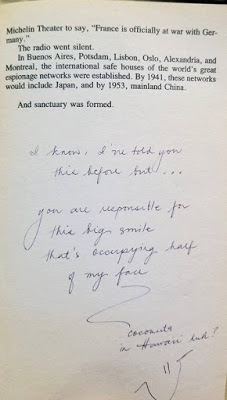 As the text of the prologue in this paperback edition comes to an end on page 9, the bottom three-quarters of the page is blank. Or at least it was until it had been adorned with ink in a flowing script...
As the text of the prologue in this paperback edition comes to an end on page 9, the bottom three-quarters of the page is blank. Or at least it was until it had been adorned with ink in a flowing script... I know I’ve told you before but...you are responsible for the big smile that’s occupying half of my face. Coconuts in Hawaii, huh?
It didn’t take a course in graphology to determine the handwriting definitely belonged to a female—including the stylized smiley face used as a signature. I was immediately distracted trying to analyze the phrase Coconuts in Hawaii, huh? Had the two people involved in this one-sided conversation been to Hawaii together, or was the term a fancy way of saying, crazy, huh? I eventually started reading again...until I hit page 15. In the middle of the page there was a blank text gap, indicating a change of scene or character point of view. Tucked tightly into the gap was more of the flowing script...
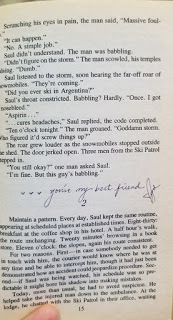 ❤
❤
❤
you’re my best friend
❤
❤
❤
you’re my best friend
This was followed by what appeared to be a scribble signature or initials, but it was indecipherable to anyone not familiar with the scrawl. Is this a girlfriend trying to get the attention of her thriller reader boyfriend? Another scrawl turns up on page thirty-three...
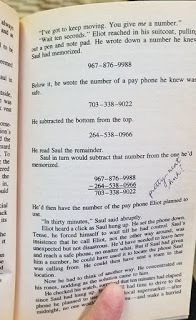 Pretty neat, huh?
Pretty neat, huh? Is this referring to the clever explanation of the piece of spycraft being reveal in the novel’s text, or to the romantic vandal’s previous comment? Things quite down until the blank space at the bottom of page 125...
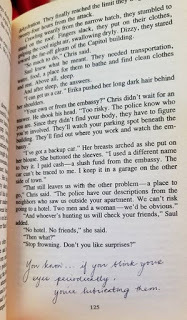 You know...If you blink your eyes periodically, you’re lubricating them.
You know...If you blink your eyes periodically, you’re lubricating them.
Is there an undercurrent of censure in that statement? Is it an indication of potential future relationship problems once this couple is beyond the infatuation stage? On page 127, however, there is possibly a quick apology...
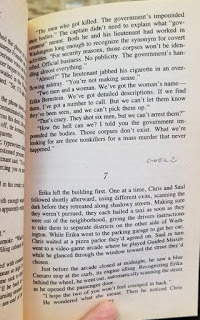 Geek J
Geek JIs this a referral to the writer or the reader? If the writer is referring to herself then she is acknowledging a shortcoming with cuteness. If she is referring to the reader, is this further censure softened by the addition of a smiley face? There is one further, more blatant attempt on page 156 to get the reader’s attention away from the novels prose...
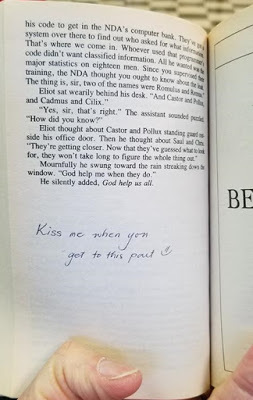 Kiss me when you get to this part J
Kiss me when you get to this part J This is definitely in the same hand, but there is an interesting switch from cursive to printing, as if the writer is trying to get her message across by lowering her expectations of the reader’s intelligence—if he can’t read cursive, I’ll try making my message simpler by printing.
I was hoping to find out what she was going to ask him to do when he reached the end of the next chapter, but alas, she either got his attention with kiss me, or she got frustrated and gave up before the guy realized he could have gotten lucky. Of course, being hidden in a David Morrell book about assassins, I also wondered if the scribbling was all some kind of secret code for real world assassins.
There is a dark side to book ephemera, a scourge of epidemic proportions—superglued price labels and bar codes unconscionably welded across covers by evil used bookstore owners. At the slightest attempt to remove them, these vile and sticky minions rejoice in tearing the cover artwork beneath them. Books which fall prey to these villainous practices must be rescued and treated with loving care. The liberal application of lighter fluid, or placing the sticker under a cheap towel and applying a hot iron, are the only cures known to dissolve the toughest adhesives. In a perfect world, readers would form teams of vigilante nightriders to backtrack these pariahs and reinstate the ritual of tar and feathering.
Let’s all take a deep cleansing and calming breath and return to one last example less destructive and more intriguing ephemera. People who disperse their books when they are finished reading often do so to various different outlets. So there is joy to be found when you realize you have reunited two books from the same previous owner, which you found perhaps years and miles apart. I’ve heard of this happening with books once owned by Harlan Ellison or Isaac Asimov, but these instances remain unverified. Perhaps they are simply intriguing fictional tall tales about fiction tomes. It is all fodder for speculation.
What are your tales of second hand secrets?
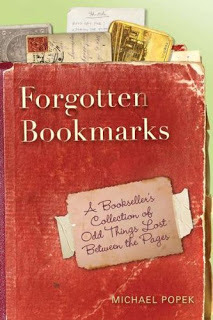
Published on February 19, 2018 18:19
February 15, 2018
WRITERS ON WRITING, PUBLISHING, AND BOOKS
 WRITERS ON WRITING, PUBLISHING, AND BOOKS
WRITERS ON WRITING, PUBLISHING, AND BOOKSWhile my fiction was admittely scarce last year for a number of boring reasons, I did write a lot of non-fiction articles and conducted a bunch of interviews...For vanity purposes, I decided to gather all of the various bits and pieces together and was surprised by how much there was...The result is these two volumes (each with over 400 pages of material), which are now available...


Published on February 15, 2018 20:28



